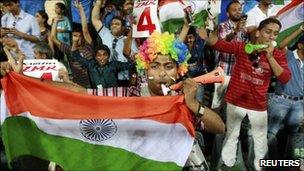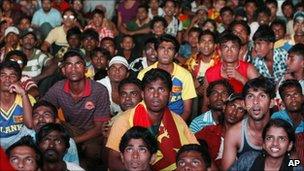World Cup cricket: Joy in India and Sri Lankan despair
- Published
Millions have poured onto the streets of India after their cricketers beat Sri Lanka in the final of the World Cup to become the first Asian nation to win the trophy twice. BBC correspondents in India and Sri Lanka describe scenes of rejoicing and dejection.
Vineet Khare, Wankhede stadium, Mumbai

India's win prompted scenes of wild celebration across India.
The wait for hundreds of millions of Indians is finally over. India are the World Cup champions again.
Mumbai erupted in a frenzy, as loud, hysterical cheers and the explosions of fire crackers announced the return of the coveted World Cup to this cricket-addicted nation after 28 years.
Ecstatic fans, wrapped in the Indian flag have invaded the streets and the drums are out.
The sky is lit-up. It is as if Diwali - the festival of lights - has arrived early. It is an unbelievable sight.
From morning there has been hardly any traffic on the road. Local trains carried a fraction of the usual load of passengers. People either stayed back at home or bought their way in to cinema halls, restaurants or pubs showing the match on giant screens.
Cricket enthusiasts painted their faces and draped themselves in the Indian tri-colour.
Securitymen posted around the stadium too kept a tab on the score.
Like others, they were confident that a strong Indian batting line-up would easily be able to chase down the modest Lankan total, though the fall of Sehwag and Tendulkar in quick succession, stunned all.
But as Dhoni and Gambhir - and later Yuvraj Singh - steadied the innings and helped the men in blue go past the Sri Lankan total, we heard a loud roar and the decibel level around the stadium went up several notches.
Honking cars and loud music set the city's mood as people hugged and congratulated each other.
The Indian cricketing Gods have provided their worshippers a night they will cherish for long.
Mumbai is exploding with joy. This party will not end anytime soon.
Charles Haviland, Colombo

With India on a roll, Sri Lankan fans were starting to look dejected
In the blazing noon sun, before the match began, fans on the Colombo seafront were confident.
"Sri Lanka will win. It'll all be one-way... We'll win because our bowlers are different," said one.
The streets emptied as fans clustered at the big public screens.
Thousands watched at the Galle Face Green promenade where Colombo-ites usually fly kites or shy couples sit under umbrellas.
Thousands more packed the sports clubs dotted around the leafy Cinnamon Gardens and other suburbs.
At the Nondescript Cricket Club, founded in 1888 "to cater to all sportsmen irrespective of caste, creed, politics or nationality" (according to its plaque), members and their families watched in carnival mood, hoping that the club's star player, Kumar Sangakkara, would lead his boys to victory in Mumbai.
There was delight as Sri Lanka perked up after their slow start.
The lilting rhythms of the "papare band" - two trumpeters, two drummers and a cymbal-player - filled the humid night air. At the half-way break fireworks tore through the sky.
But by the time Mahendra Singh Dhoni got his 50th run, fans were looking dejected. India were on a roll with seven wickets in hand.
At the 45th over the band were still playing their hearts out.
But by then the match was lost and, as India won, the fans slumped in their chairs, silent, in seeming disbelief. Sri Lanka had been great but not quite good enough on the day.
Yet even after it was all over, there were two more rounds of fireworks, as if to celebrate even this achievement.
Stacks of others were saved to be used on another, happier day.